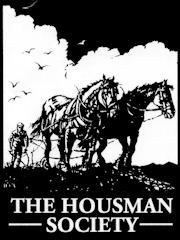A Shropshire Lad
|
Key: V: Textual Variation. C: Commentary. Q: Question. Glossary
ASL XLI “In my own shire, if I was sad”
Top ▲ Glossary
| Line | Word | Glossary |
| 2 | homely | Having a simple, unpretentious, and warm-hearted manner |
| 7 | bourn | A destination or boundary between one place or one thing and another |
| 16 | Lady-smocks | Common name for cuckoo-flowers (Cardamine pratensis) |
| 18 | azured | Deep blue, like the colour of a clear sky; also coloured blue on a coat of arms |
| 20 | range | To move freely across, through, or back and forth within a particular area |
| 21 | ken | To know somebody or something |
| 23 | plight | State of mind or mood (OED, used 1726) |
Top ▲ Commentary
| Line | Commentary |
| Date: Oct – Dec 1895 | |
| 7 | In Shakespeare’s Hamlet (III, I, 81-2), death is described as, “The undiscovered country from whose bourn| No traveller returns.“ |
| 17 | skylit: The Oxford English Dictionary cites this as the first use of the word |
| 21 | This is another poem from the selection that contrasts the experience of London with that of Shropshire; in this case the contrast is emphasized by the two (unequal) stanzas. |
| Meter | Alternate lines of eight and seven syllables, rhymed as couplets. |
Top ▲ Variations
| Line | Text | Textual variation |
| 22 | helpmates] comrades |
Top ▲ Questions
| Line | Question |
| 2 | What is the effect of the shorter, even-numbered lines upon the mood of the poem? |
| 3 | Which features of the natural world act as “homely comforters” in the first stanza? Why do you think these particular examples are chosen? |
| 21 | How are these comforters contrasted in the second stanza? |
| 22 | Does the phrase “only men” suggest a misanthropic personality on the part of the narrator? What other evidence is there for this? |
| 26 | How do you interpret the phrase, “many an eye that measures me“? |
| 31-32 | Why do you think the poet ends the poem with two entirely monosyllabic lines? |
